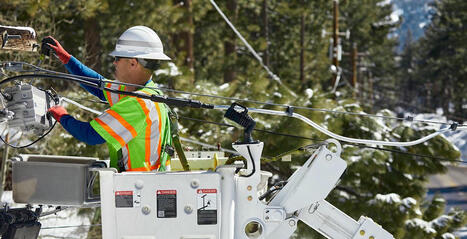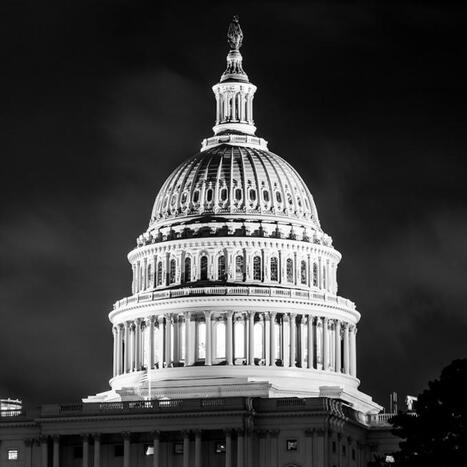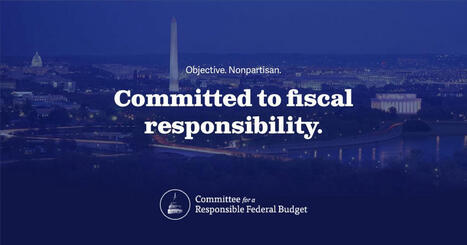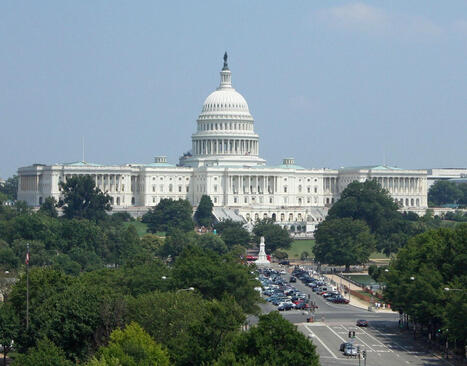 Your new post is loading...
 Your new post is loading...
I know it's been a while since we published the last edition of this newsletter, but for a good reason! Over the past few months, I've had the opportunity to work with some really great companies on their annual strategic planning initiatives—something I’m absolutely passionate about. Helping broadband providers navigate industry disruption and uncertainty so they can achieve their goals requires intentionality: knowing where you’re headed, the actions you’ll take to get there, and—just as importantly—what you’re choosing not to do. As I’ve prepared for these sessions, I’ve been analyzing broader industry trends and asking: what do these shifts mean for the providers I work with? One particular trend keeps coming up repeatedly—something consistent enough across sources and conversations that I thought it was worth sharing with all of you. A New Dynamic: Slowing Growth in Network Consumption Click headline to read more--
The next round of the Broadband Equity, Access, and Deployment (BEAD) Program is upon us. The National Telecommunications and Information Administration (NTIA) says that the 56 states and territories have all been approved to move to the BEAD “Benefit of the Bargain” round of the subgrantee selection. The NTIA issued new guidelines for the $42.5 billion BEAD program in June. Part of the process was for states and territories to correct their BEAD initial proposals to comply with the rules based on the new set of priorities. All of the revised initial proposals have been received and approved, according to the NTIA. The new process aims to ensure the greatest possible impact from investments. It eliminates the preference for fiber included in the original BEAD guidelines and what the press release calls “extralegal, burdensome requirements.” In the guidelines released early last month, the NTIA directed applicants to choose the lowest cost applicant in most cases.
The NTIA's BEAD program has been overhauled to potentially shift billions from fiber networks to unlicensed fixed wireless, but a move by Congress to auction off the spectrum needed for those networks puts their future at risk.
National security leaders rarely get to choose what to care about and how much to care about it. They are more often subjects of circumstances beyond their control. The September 11 attacks reversed the George W. Bush administration’s plan to reduce the United States’ global commitments and responsibilities. Revolutions across the Arab world pushed President Barack Obama back into the Middle East just as he was trying to pull the United States out. And Russia’s invasion of Ukraine upended the Biden administration’s goal of establishing “stable and predictable” relations with Moscow so that it could focus on strategic competition with China. Policymakers could foresee many of the underlying forces and trends driving these agenda-shaping events. Yet for the most part, they failed to plan for the most challenging manifestations of where these forces would lead. They had to scramble to reconceptualize and recalibrate their strategies to respond to unfolding events. The rapid advance of artificial intelligence—and the possible emergence of artificial general intelligence—promises to present policymakers with even greater disruption.
Starlink users reported they couldn’t connect to SpaceX’s satellite internet service for a few hours on Thursday afternoon before service was eventually restored. Widespread Starlink outages, like the ones we reported on in 2022 and 2023, have been rare, and this appears to be the first one in 2025. The outage began around 3:15PM ET or so, with users receiving error messages saying there is “no healthy upstream.” Starlink posted a message on X at 4:05PM ET: “Starlink is currently in a network outage and we are actively implementing a solution. We appreciate your patience, we’ll share an update once this issue is resolved.” At 6:23PM ET, Starlink engineering VP Michael Nicolls followed that up with a message saying that after a 2.5-hour outage, the network has “mostly recovered.” “The outage was due to failure of key internal software services that operate the core network,” writes Nicolls, without going into specific detail.
Spectrum has expanded its Internet, Mobile, TV and Voice services to more than 4,700 homes and small businesses in previously unserved or underserved addresses in 14 communities across Wexford County, Michigan.
The FCC has launched a rulemaking focused on accelerating the retirement of aging copper networks and freeing up billions for new fiber networks. #pressrelease
Average LEO bids were $228K, a fraction of the $2.7M requested by fiber providers, on average.
The DCF Show catches up with Hunter Newby and Connected Nation as they break ground in Wichita, bringing Kansas its first IXP and a new model for regional connectivity an
KGPCo and Tarana Wireless have formed a strategic partnership to leverage Tarana’s fixed wireless access technology.
Three Michigan-based companies have completed a 90-mile underground fiber optic route linking Southfield to Lansing.
A movement that wanted to merge North America into one nation and extend its borders as far as the Panama Canal might sound incredibly familiar. But this group, called the “technocracy movement”, was a group of 1930s nonconformists with big ideas about how to rearrange US society. They proposed a vision that would get rid of waste and make North America highly productive by using technology and science. The Technocrats, sometimes also called Technocracy Inc, proposed merging Canada, Greenland, Mexico, the US and parts of central America into a single continental unit. This they called a “Technate”. It was to be governed by technocratic principles, rather than by national borders and traditional political divisions. These ideas seem to resonate with some recent statements from the Trump administration about merging the US with Canada. Meanwhile, the US Department of Government Efficiency (Doge) set up by Trump and led by tech billionaire Elon Musk, has also outlined a vision of efficiency cuts by slashing bureaucracy, jobs and getting rid of leaders of organisations and civil servants he thinks are advancing “woke” values (such as diversity initiatives). This slash-and-burn approach also fits with some of the ideas of the Technocrats. In February, Musk said: “We really have here rule of the bureaucracy as opposed to rule of the people — democracy”. The Technocrats viewed elected politicians as incompetent. They advocated replacing them with experts in science and engineering, who would “objectively” manage resources for the benefit of society. “The people voted for major government reform, and that’s what the people are going to get,” Musk told reporters after visiting the White House last month.
T-Mobile is rolling out its Starlink-powered satellite service, T-Satellite, which will let customers with supported devices send text messages and share their location without cellular service.
|
Sarah Morris is currently Managing Director at Waxman Strategies where she is building a technology practice. Waxman is a values-driven consulting firm. Sarah Morris was in the thick of BEAD in the Department of Commerce in 2024. Serving as the Principal Deputy Assistant Secretary makes her a great source to talk about the June 6 BEAD guidance, what it means, and how states can still proceed with a program that was designed to be a fiber-first, futureproof solution for rural America. She was asked to testify before the House Energy and Commerce on March 6th, when she was peppered with questions about why BEAD ‘had not connected a single home’ and how to proceed. Click headline to read the interview--
Last week, a California Assemblymember who had sponsored legislation for a broadband affordability law abruptly withdrew the legislation. But what really killed the broadband affordability bill in California? Was it opposition to the proposed legislation from within the state or pressure from the Trump administration? The Bill Was Advancing Until…
Several Lake County Board members recently returned from the National Association of Counties Annual Conference in Philadelphia, where they participated in important policy discussions and helped advance county priorities on the national stage. “NACo brings counties from across the country together to share ideas, elevate local issues and drive change at the federal level,” Sandy Hart, Lake County Board chair, said in the release. “Speaking with one voice helps ensure that the needs of our communities are clearly heard in national discussions.” Thousands of county leaders from across the U.S. were engage in policy discussions and adopted resolutions that will guide NACo’s federal advocacy efforts for the coming year, according to a news release. High-speed internet infrastructure: A resolution urging federal support and implementation of the Broadband Equity, Access, and Deployment program to expand broadband infrastructure in unserved and underserved areas.
Governor Hochul announced the re-release of the ConnectALL Digital Equity Program Capacity Grant Request for Applications (RFA), committing over $5 million in State funding to continue New York's digital equity grantmaking after federal funding was terminated by the Trump administration in May 2025.
As the lone member of the Federal Communications Commission who was appointed by a Democratic president, Anna M. Gomez always knew she would have little official influence over the impending merger of Skydance Media and CBS parent company Paramount. But for weeks before the deal was approved Thursday by a 2-1 vote, with her as the sole dissenter, she has used her bully pulpit to express concerns about the merger and some of the concessions Skydance has made to win the approval of the FCC and its chairman, Brendan Carr, an appointee of President Donald Trump who has vowed to take action against what he says is bias in media.
The $8 billion deal's green light comes after CBS reached a $16 million settlement with Donald Trump over his lawsuit against "60 Minutes"
As if low-orbit space isn’t already getting over-crowded, there is a startup that may send huge numbers of additional satellites into orbit. The California company is Spinlaunch. Spinlaunch plans to shoot microsatellites into orbit using what they call a centrifugal cannon (pictured to the right). The cannon spins and accelerates a small rocket that will…
The Texas Comptroller’s office has opened applications for a $3.8 billion fund combining federal BEAD and state TMAP resources to deliver high-speed internet to more than 245,000 unserved and underserved homes, businesses, and schools by August 2025.
YouTube continues to lead in the streaming market, with ad revenue increasing by 13% to $9.8 billion.
The recently-enacted One Big Beautiful Bill Act (OBBBA) will increase borrowing by $4.1 trillion through 2034 on a conventional basis, according to new estimates from the Congressional Budget Office (CBO). This includes $5.9 trillion of tax cuts and spending increases, $2.5 trillion of offsets, and over $700 billion of interest costs. On a permanent basis, we estimate the law will add over $5.5 trillion to the debt through 2034.
Arielle Roth has been confirmed by the U.S. Senate to lead up the National Telecommunications and Information Administration (NTIA).
Hello, and welcome to Decoder! This is Jon Fortt, CNBC journalist, cohost of Closing Bell: Overtime, and creator of the Fortt Knox streaming series on LinkedIn. I’m guest-hosting for a couple more episodes of Decoder this summer while Nilay is out on parental leave. Click headline to read more of the transcript or listen to the podcast--
|



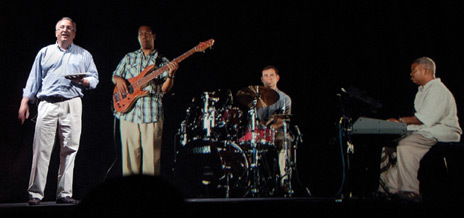


 Your new post is loading...
Your new post is loading...


